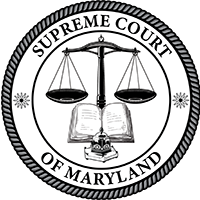SCHEDULE OF ORAL ARGUMENTS
September Term, 2023
Friday, April 5, 2024:
Bar Admissions
No. 22 Aaron Jarvis v. State of Maryland
Issues – Criminal Law – 1) Did the ACM err when it held that the trial court’s erroneous refusal to instruct the jury on attempted voluntary manslaughter based on imperfect self-defense was harmless error where had the petitioner been convicted of attempted voluntary manslaughter rather than first-degree assault his sentence would be shorter? 2) Did the ACM err when it held that the trial court abused its discretion in not instructing the jury on imperfect self-defense?
Attorney for Petitioner/Cross-Respondent: Piedad Gomez
Attorney for Respondent/Cross-Petitioner: Zoe Gillen White
No. 20 Roseberline Turenne v. State of Maryland
Issue – Criminal Law – Is the evidence insufficient to sustain the child pornography convictions under Md. Code Criminal Law Article (“CL”) §§ 11-207(a)(1) and -208(b) and child sex abuse convictions under CL § 3-602(b)? (A) What is the appropriate test to determine whether an image constitutes “lascivious exhibition of the genitals” under the child pornography statutes? (B) What role, if any, does evidence of possession of adult pornography play in assessing the sufficiency of the evidence?
Attorney for Petitioner: Michele D. Hall
Attorney for Respondent: Gary E. O'Connor
Tuesday, April 9, 2024:
No. 24 Darryl Edward Freeman v. State of Maryland
Issues – Criminal Law – 1) Where a witness is not disclosed in discovery or offered at trial as an expert, does Md. law recognize a theory that such a witness may “implicitly” be found to be an expert and therefore provide opinion testimony? 2) Assuming that such an implicit finding is valid, by what means does an opposing party determine the field or area of the witness’s alleged expertise? 3) In the instant case was the detective, who was not disclosed or offered as an expert, properly permitted to testify that in his opinion the words “lick” and “sweet licks,” referred to in text messages between petitioner and his alleged co-conspirators, meant “robbery” and “robbery of an easy target” respectively? 4) Regardless of whether the trial judge makes an implicit or explicit finding, does the State’s noncompliance with Md. Rule 4-263(d)(8) preclude the calling of an expert witness? 5) May a lay witness testify to the meaning of a slang term with which the witness is familiar? 6) Did the trial court in this case properly permit the detective to give lay opinion testimony that the word “lick” means “a robbery”?
Attorney for Petitioner/Cross-Respondent: Michael R. Braudes
Attorney for Respondent/Cross-Petitioner: W. Elliott Hunter
No. 16 Adventist HealthCare, Inc. v. Steven S. Behram
Issues – Health Occupations – 1) Did the ACM err by relying on extrinsic evidence in its interpretation of the fully integrated Settlement Agreement without determining whether the Agreement is ambiguous or considering the effect of its integration clause in contravention of settled Maryland law? 2) Did the ACM err by failing to apply standard principles of contract interpretation, by interpreting a Settlement Agreement that expressly releases claims related to three specific events, as unambiguously releasing claims related to other events, and thereby exclude extrinsic evidence that showed that the parties did not intend to release claims related to those other events?
Attorneys for Petitioner/Cross-Respondent: Benjamin S. Vaughan and Robert D. Anderson
Attorney for Respondent/Cross-Petitioner: Steven M. Pavsner
After April 9, 2024, the Court will recess until May 2, 2024. On the day of argument, counsel must register in the Clerk’s Office no later than 9:30 a.m. unless otherwise notified.
GREGORY HILTON
CLERK

